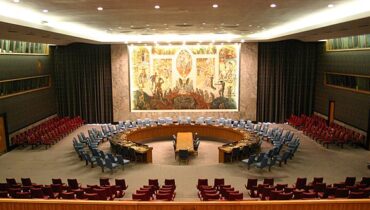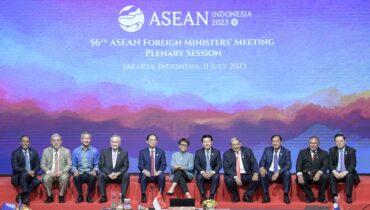On the occasion of the Anniversary of the signing of the 1998 Good Friday Agreement, which brought an end to decades of violent conflict in Northern Ireland, the Institute for Women, Peace and Security hosted a film screening and panel discussion celebrating one of the key players in the struggle for peace: Inez McCormack.
“Inez: A Challenging Woman,” directed by Eimhear O’Neill and Trevor Birney, explores the life and legacy of one of Northern Ireland’s leading human rights activists. The film won Best Short Documentary award at the Galway Film Festival and has since been screened around Ireland and the United States.
Amb. Melanne Verveer opened the program at Georgetown by echoing one of Inez’s constant reminders: to always think about who is not at the table. This remained a theme throughout Inez’s long struggle to bring peace and dignity to Northern Ireland’s most marginalized communities through her work as a civil rights activist, union leader and feminist.
The film follows her life from her political awakening during the 1968 civil rights movement in Northern Ireland, her early work in Belfast’s working class neighborhoods, her rise to becoming a trade union leader, her strong transatlantic influence in Washington and New York, her role in the decades-long endeavor to bring peace to a divided society, and her continued advocacy for the disadvantaged.
As Inez herself said, there is no joy in being the first woman to do anything, but as she blazed a trail for women, she made sure the path would be easier for those coming behind her. The film includes testimonies from dozens of Inez’s friends and colleagues including Hillary Clinton, Mary Robinson, Melanne Verveer, Karen Nussbaum, Michael Higgins and Meryl Streep, as well as those lesser-known figures with whom she worked at the community level, who pay tribute to her widespread influence.
Inez was a chief architect and advocate of the MacBride Principles – fair employment principles for U.S. businesses working in Northern Ireland – and was a key partner throughout the peace process. “She loomed as the critical player; she was an intermediary for us,” recalled Melanne Verveer in the film. Inez was also instrumental in ensuring the language of human rights remained central to the agreement and was a point person for both politicians and activists in the struggle to implement those rights. “The first person they would turn to, North or South, was Inez,” recounted Irish President Michael Higgins.
Following the film screening, Ambassador Verveer moderated a conversation between Inez’s friends, colleagues and admirers reflecting on the many facets of Inez’s legacy. Irish Ambassador Anne Anderson emphasized Inez’s frequent call that peace dividends need to be felt by the most marginalized in society. Norman Houston, Director of the Northern Ireland Bureau in DC, and Baroness Mary Goudie of the UK House of Lords, remembered Inez as a champion of the marginalized and a key liaison with partners in the United States and Britain throughout the peace process. Alyse Nelson, CEO of Vital Voices, spoke about Inez’s continual efforts to help women not only in Northern Ireland, but also around the world. Inez mentored women in Israel and Palestine – another divided society caught in seemingly intractable conflict – and was a role model for women in conflict zones across the globe. Dr. Kimberly Cowell-Meyers, professor of government at American University, argued that Inez’s early efforts to bring together women from both sides of the political divide laid the foundation that made it possible for women to form a coalition party and gain access to the formal negotiation table during the Good Friday Talks in 1998.
The program closed with a call to action from Patricia McKeown, a former colleague of Inez’s at the Unison Union, who reminded the audience that Northern Ireland is far from the peace imagined in the Good Friday Agreement. The human rights and equality legislation, integral in the agreement itself, has been largely ignored in the almost two decades since 1998. For Inez, the signing of the peace agreement in 1998 was only a starting point. And, as McKeown concluded, part of her rich legacy is her unwavering commitment that inspires others to continue her work until the most disadvantaged communities are heard and can reap the benefits of peace.
“She gave a voice to working class women, women like me,” recounted Rosaleen Davidson, a hospital worker interviewed in the film, “And she gave them the idea that we’re worth something. And that will live forever.”


